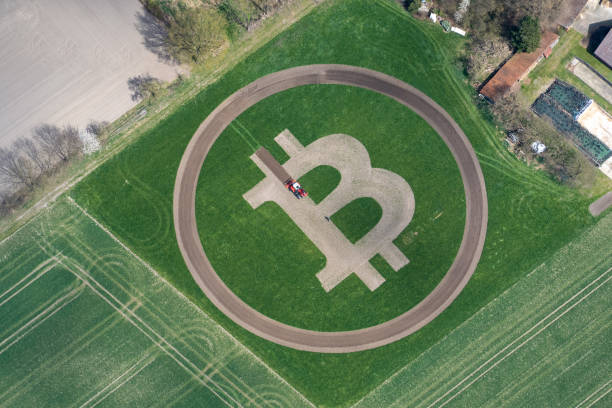Last Updated on May 10, 2023

The demand for cryptocurrencies has soared like few other trading commodities in the last ten years. The whole cryptocurrency market capitalization has already surpassed $3 trillion, and the price of Bitcoin in early 2022 was nearly double that of a year ago. The rise in the price of these online currencies has sparked a frenzy of demand, enticing millions of people to try their hand at crypto – without understanding it and the blockchain or taking into account the environmental consequences.
Cryptocurrency mining consumes a lot of electricity. While mining is only one way of validating its transactions and minting new coins, Bitcoin and Ethereum, the two most popular cryptocurrencies, use it. Cryptocurrency, according to many social and environmental activists, is harmful to the environment and has a significant carbon footprint.
Read: All You Need To Know About Cryptocurrency
What is Cryptocurrency Mining?
Mining is the process of creating Bitcoin and other cryptocurrencies, as well as verifying transactions involving new coins. It entails large, decentralized networks of computers all over the world that verify and secure blockchain or virtual ledgers that record crypto transactions.
In exchange for providing their processing power, computers on the network are rewarded with new currencies. Miners keep the blockchain secure, the blockchain rewards coins, and the coins incentivize miners to keep the network secure. It’s a virtuous circle.
Crypto mining has two purposes: it creates new cryptocurrency and confirms the validity of existing cryptocurrency transactions on the blockchain. After completing the process of confirming a block of transactions, a miner is paid. What do they get in exchange? To add to their wallets, newly created cryptocurrency.
Energy Consumption of Cryptocurrency Mining
The amount of energy consumed for Bitcoin mining cannot be directly calculated, however it can be inferred based on the network’s hash rate and the consumption of commercially available mining rigs. According to the Cambridge Bitcoin Electricity Consumption Index, Bitcoin, the most widely-mined cryptocurrency network, consumed an estimated 26.73 Terawatt-hours of electricity per year and 167.72 Terawatt-hours of electricity through energy assets at the production point in 2020, which is more than the Netherlands, Argentina, or the United Arab Emirates.
Based on energy use through May 27, 2022, another estimate from Digiconomist, a cryptocurrency analytics site, puts the total at 204.5 Terawatt-hours. This equates to around 2,159 kilowatt-hours of electricity every transaction, which is the same amount of electricity utilized by the average American household over 74.01 days.
Based on energy use through May 27, 2022, Ethereum, the second-largest cryptocurrency network, is expected to utilize 87.29 Terawatt-hours of electricity per year, which is comparable to Finland’s power consumption. The typical Ethereum transaction used 210.16 kilowatt-hours of electricity, which is equivalent to the amount of electricity consumed by an ordinary American household in 7.1 days. Ethereum developers are working on a low-energy proof-of-stake consensus mechanism, but this aim is still a long way off.
If prices and user acceptance continue to rise, the quantity of energy needed by cryptocurrency mining is likely to rise as well. Mining cryptocurrency is a competitive process: as the value of the block reward rises, so do the incentives to begin mining. Higher cryptocurrency values indicate that crypto networks consume more electricity.
Why Cryptocurrency Mining Requires Energy
To prevent a single person or organization from taking control of the entire network, digital currencies were designed to be difficult to mine and need a lot of processing power to manufacture. This feature contributes to the decentralized nature of cryptocurrencies, which means they are not controlled by a single entity.
Popular cryptocurrencies such as Bitcoin and Ethereum use a proof of work (PoW) mechanism, which requires people to solve equations of variable complexity in order to mine new coins and add new blocks of information to the blockchain of a digital currency. This approach was created in part to combat cyberattacks in which a single individual establishes a slew of phony identities and uses them to gain control of a network’s majority.
Because everyone on the network is competing to solve these equations first and receive the monetary prize, the person with the most processing power has the best chance of winning. As a result, people are building larger mining rigs (or even networks of mining rigs) to process equations faster. Because the quantity of energy utilized is proportional to the size of the mining network, mining new coins require ever-increasing quantities of energy.
The amount of bitcoin mining operations are also affected by the price and availability of electricity. If the power in one country (or even a region of a country) is cheaper than in another, it makes economic sense to concentrate mining operations there.
One thing to keep in mind when discussing cryptocurrency’s environmental impact is that the amount of energy it consumes may not be precisely proportional to carbon emissions. The energy mix—or what sources miners draw from—will affect the real carbon emissions of cryptocurrency mining, according to the Harvard Business Review.
Effect of Cryptocurrency Mining on the Environment
In the United States, fossil fuels such as natural gas, coal, and petroleum account for around 60% of the grid’s electricity. While it’s safe to assume that mining operations in the United States rely on fossil fuels for the majority of their electricity, this may not be the case in other countries. Given Bitcoin’s massive energy use, it seems like grasping at straws to claim it isn’t contributing to greenhouse gas emissions in some manner.
The power plants required for crypto mining can have a negative influence on the ecosystem. According to Columbia Climate School, the Greenidge Generation facility in Dresden, New York, pulls millions of gallons of water to cool itself while operating, and some of that water is discharged back into Lake Seneca at temperatures 30-50 degrees Fahrenheit over normal, thereby endangering species in the water.
Could Cryptocurrency Mining Use Less Energy?
Large-scale bitcoin miners are frequently found in areas where energy is plentiful, reliable, and inexpensive. Processing cryptocurrency transactions and minting new coins, on the other hand, do not have to be energy-intensive processes.
The proof-of-stake (PoS) technique of authenticating cryptocurrency transactions and minting new coins is a non-computing-intensive alternative to cryptocurrency mining. Instead, the permission to validate transactions and manage the crypto network is awarded according to how much cryptocurrency a validator has “staked,” or pledged not to trade or sell.
Other validation methods are being developed, such as proof of history, proof of elapsed time, proof of burn, and proof of capacity. While Ethereum developers have indicated their desire to move away from proof-of-work, the Bitcoin community has not stated such a goal. As a result, mining, along with its high energy costs, is likely to continue.
Before you go…
Hey, thank you for reading this blog to the end. I hope it was helpful. Let me tell you a little bit about Nicholas Idoko Technologies. We help businesses and companies build an online presence by developing web, mobile, desktop, and blockchain applications.
As a company, we work with your budget in developing your ideas and projects beautifully and elegantly as well as participate in the growth of your business. We do a lot of freelance work in various sectors such as blockchain, booking, e-commerce, education, online games, voting, and payments. Our ability to provide the needed resources to help clients develop their software packages for their targeted audience on schedule is unmatched.
Be sure to contact us if you need our services! We are readily available.











